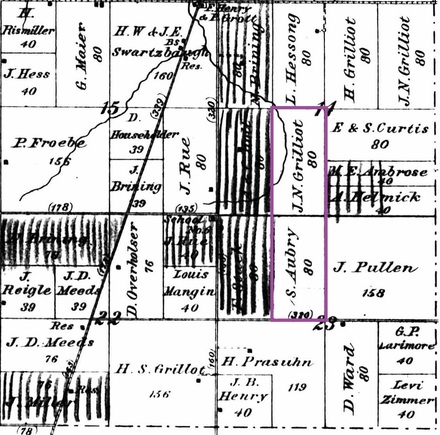
In modern society, it's absolutely ridiculous to tell a single mom (or dad) to get married, or stay married in an unhealthy relationship, just to avoid poverty. (This is my opinion, but I think a lot of you would agree with me.) And many of the online comments reflected how extreme this option seems in the 21st century. How could you marry someone without being in love with them? Why would you take vows to stay with a person forever just because it will help you economically? And in today's world, it does sound absurd, BUT until relatively recently this WAS how single-parent families, especially those with young children, DID stay out of poverty.
Let's go back, say, 150 years. You live in a small rural farming community. How did you meet your first husband? At church? Or maybe you attended the local schoolhouse together? Perhaps your fathers farmed land adjacent to one another. Considering how slow and difficult traveling long distances was at that time, most people tended to stay near their towns and most definitely within their home counties for their entire lives.
The image below is a map of land owners in Wabash Twp, Darke County, Ohio in 1875. My husband's great-great-great-grandparents were John Nicolas (J.N.) Grilliot and Mary Anne Aubry. Just by looking at the map, you can see how (and why) the marriage came about. ("S. Aubry" is Mary Anne's brother, Stephen, who inherited the land from their father when he died in 1873. Stephen actually married one of John Nicolas's sisters.)
Ok, so you are, say, 34 years old, living with your husband on your farm (which you may own outright or on which you may be paying a mortgage) and you have 6-7 kids. What happens to your family should you or your husband suddenly die? In a time when good hygiene and antibiotics didn't exist, disease and infection were all-too-common parts of life. In the mid 19th century, women were 40 times more likely to die from childbirth-related complications than they are today. Work-related accidents, whether on the farm or in a factory, took many parents' lives as well. Life insurance did not exist and many families only scraped by as it was, so there was no savings to draw from. There were no government-sponsored welfare programs; any assistance to families in distress originated from local neighbors and churches.
Widows and widowers with small children usually found it necessary to remarry in order to keep their families intact and to keep food on the table. There were no such things as day care centers to watch the kids while mom or dad worked 12-14 hour days. Occasionally, neighbors or extended family members could help, but nearly everyone had their own families to support and sometimes they could not handle that extra burden. A struggling single parent would often be forced to send several of his/her children, some as young as nine years old, to live and work for other families as farmhands or house servants. Even if they were able to stay at home, other children would be forced to quit school in order to work on the homestead or find a job in the community.
The death of a parent forced my grandfather's family to split up temporarily. My great-grandmother, a Polish immigrant, died suddenly of appendicitis in 1919 at the age of 29, leaving my great-grandfather with four sons between the ages of ten and five. In the 1920 census, my great-grandfather and the two oldest boys are living with a cousin and the third boy is living with another family. I cannot find my grandfather, the youngest, in this census, so I don't know where or with whom he was living. My great-grandfather remarried in 1921, at which point I know the brothers were reunited.
Did all of these widows and widowers marry because they fell in love, or was it more because of the need to take care of their families? Old marriage certificates can't tell us that, so we'll never know for sure. It's unrealistic to expect single parents to do so today, but, if I ever did find out that one (or more) of my ancestors' marriages were for more practical reasons other than for love, I would not judge them or think less of them. They did what they had to do for their families and their livelihoods.
©2014, copyright Emily Kowalski Schroeder



